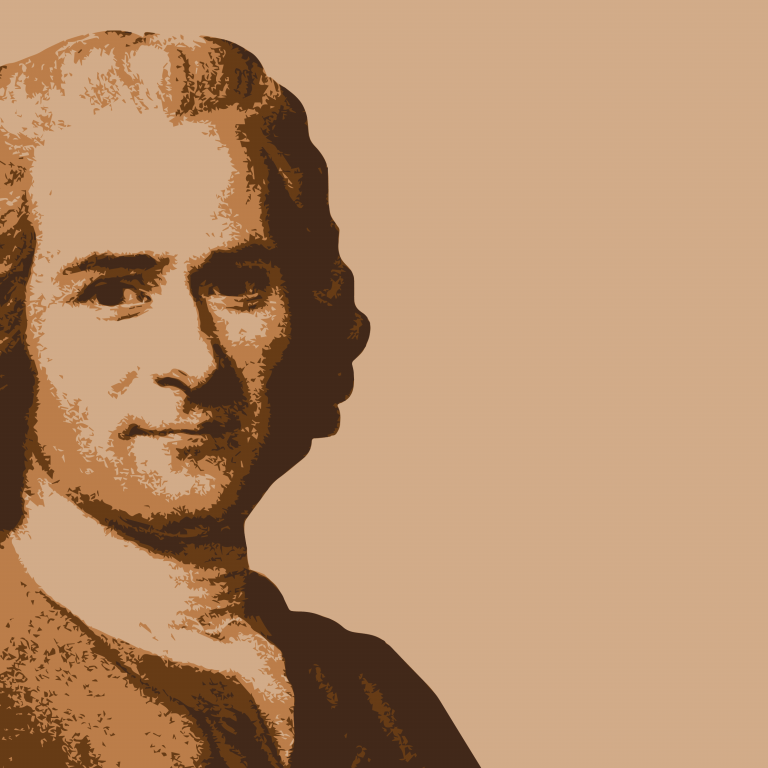Report on the Bi-Annual Meeting of the Rousseau Association (University of Florida, June 2017)
This conference was co-organized by Brigitte Weltman-Aron (LLC, UF), Peter Westmoreland (Philosophy, UF), and Ourida Mostefai (Brown University). It was sponsored, among others, by the Department of Languages, Literatures and Cultures, the France Florida Research Institute, and the Center for the Humanities and the Public Sphere.
The following report appeared first in the Rousseau Bulletin in September 2017, and is reprinted with the authorization of the author, Patrick Cox, and the President of the Association, Ourida Mostefai.
Silence, the Implicit and the Unspoken in Rousseau
The 20th Biennial Colloquium of the Rousseau Association convened on the 1st of June in Ustler Hall on the University of Florida’s charming Gainesville campus. Margaret U. Fields, the Associate Dean of the College of Liberal Arts and Sciences, provided us with opening remarks before Michael O’Dea’s keynote address. Titled “Another Rousseau, Re-imagining a Writer using his Silences,” the address situated us for an engaging weekend of presentations, reflection, and discourse on an author who is subtly sensitive to silence yet unabashedly seasoned in the realm of sensationalist statements. Pleasantly surprising and satiating Mediterranean fare followed the insightful keynote address at the evening reception. Post-salmon, the Colloquium reconvened moments later at The Swamp to indulge in more immediate waters, sampling gator bites garnished with conversation and libations.
For Rousseau, a thinker who is explicitly wary of unnecessary learning and amusement, the concept of silence can prove germane to many areas of his thought. As has come to be expected of the Association’s Colloquia, the disciplinary diversity of this year’s Colloquium allowed for panels from across an academic range. We explored silence as an authority, silence in the Observations, the politics of silence, pantomime in Pygmalion, the role of gestures in Rousseau’s theory of language, and the possibility of silence in the expression of the general will.
Friday morning began with two far-from-silent sessions on Rousseau’s quiescence. Before returning to the ethereal realm with catered Cuban cuisine that so aptly reminds of our geographical location and of the multicultural influence here, the University of Florida Library transported us deeper into the eighteenth century with an enchanting collection of manuscripts that were available to Rousseau’s contemporaries. In the Rare Books Collection’s gorgeous Judaica Reading Room, itself a testament to the silence imposed upon and the persecution of the Jewish people, we leafed through copies of Emile and The Social Contract that may very well have reached the Parisian and Genevan authorities who silenced them.
After two more stimulating panels, the evening concluded with another exceptional dining selection in Leonardo’s for the banquet, providing delicious eclectic fare. The Colloquium returned on Saturday morning with the business meeting, at which the Association decided on Stockholm University and the topic of “Rousseau and Aesthetic Experience: Art, Nature, Politics” for the 21st Biennial Colloquium, to be organized for 2019 by Maria Gullstam and Jennie Nell.
The first few panels of the day further explored silence in Rousseau’s political writings. American fare was catered for lunch before closing the conference with a handful of delightful presentations on silence in Rousseau’s philosophy of music and of art.
Amidst a weekend of outstanding presentations and discussions, only a few key points can be covered in this brief review. Masano Yamashita discussed the laconic nature of Rousseau’s writing in The Social Contract, a self-contained work that was yet intended to be part of a much greater volume, as we learn from his metatextual accounts. Her paper connected Rousseau’s minimalist textual economy in The Social Contract to his silence on the emotions throughout the text, arguing that an interpretation of the passage on civil religion must be attentive to such laconism to recognize the civil religion not as a matter of thoughtless acceptance but as a product of reason.
Peter Westmoreland seemed to respond in Saturday’s first presentation, reorienting us with emphasis on the laws of the heart in The Social Contract and grounding us in a more literal interpretation of Rousseau’s words. Rather than directing us to a facility in detaching meaning from their words in Rousseau’s works, he suggests that Rousseau speaks both from the heart and to the hearts of his compatriots.
Adam Burgos’ paper concordantly gave preponderance to the laws of the heart for Rousseau and, moreover, established silence as an authoritative tool of the Legislator, who preserves society’s mores by remaining silent on pernicious truths. The Legislator, the tutor in Emile, and the individual moral agent must be contextually sensitive when imparting truths that might belie the ideals of the social contract, of natural education, and of morality, respectively.
Reflecting on a full and fulfilling conference on Rousseau that eschewed silence in practice, I am happy to have spent the weekend enriching my understanding of Rousseau in the company of fellow Rousseauists and am tremendously grateful to the hosts — Brigitte Weltman-Aron, Peter Westmoreland, and Ourida Mostefai — for preparing a phenomenal meeting.
